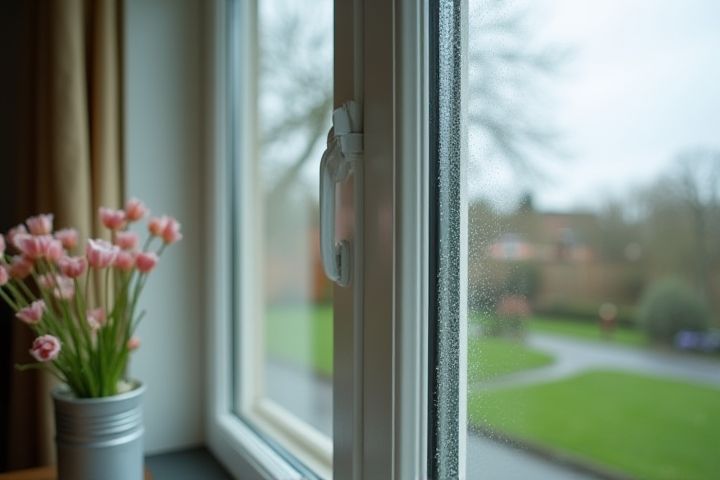
Tinted house windows provide significant benefits, such as enhanced energy efficiency by reducing heat gain during summer months, ultimately lowering your cooling costs. Applying window film can also protect your interior furnishings from harmful UV rays, which can cause fading over time. Privacy is another advantage, as tinted windows obstruct the view from outside while still allowing natural light to enter your home. Depending on local regulations, tinted windows can also enhance the aesthetic appeal of your property, giving it a modern look. It's essential to consider the type of tint and its level of reflectivity to ensure it meets your specific needs and local building codes.
Should House Windows Be Tinted
Energy efficiency improvement
Tinted house windows can significantly enhance energy efficiency by reducing heat gain from sunlight. Studies show that window films can filter out up to 99% of harmful UV rays while reducing solar heat gain by as much as 84%. This translates to lower cooling costs during hot months, potentially saving homeowners 10% to 30% on energy bills. By improving thermal insulation, tinted windows also help maintain consistent indoor temperatures, making your living space more comfortable year-round.
Glare reduction
Tinted windows can significantly reduce glare in your home, improving comfort and visibility. By blocking up to 99% of harmful UV rays, window films help protect your furniture and flooring from fading, while enhancing your overall indoor experience. Standard window film can decrease glare by 30% to 90%, depending on its specific rating, making activities like reading or watching television much more enjoyable. If you live in a sun-soaked area, investing in window tinting can be a practical solution for maintaining a comfortable living environment.
UV protection
Tinting your house windows significantly enhances UV protection, blocking up to 99% of harmful ultraviolet rays that can lead to skin damage and fading of furniture. This protective film acts as a barrier, lowering indoor temperatures while reducing reliance on air conditioning, potentially lowering your energy bills. By installing UV-filtering window films, you also preserve the integrity of your interior spaces, contributing to longer-lasting aesthetics. Overall, investing in window tinting is a smart choice for maintaining your home's comfort and safeguarding your health.
Enhanced privacy
Tinted house windows offer enhanced privacy by limiting the visibility into your living spaces, allowing you to enjoy natural light without compromising your security. This feature is particularly beneficial for homes located in densely populated areas or near busy streets, where the risk of prying eyes is higher. By applying window film with a darker tint, you can effectively obscure interior views while still maintaining a clear view of the outdoors. Additionally, window tints can help regulate indoor temperatures, providing you with both comfort and energy savings.
Aesthetic appeal
Tinted house windows enhance the aesthetic appeal of your home by adding a sleek, modern look that can boost curb appeal. Available in a range of shades and styles, window tints allow for personalization while complementing your architectural design. This treatment not only offers visual interest but also increases privacy, creating a serene atmosphere inside without sacrificing natural light. Additionally, well-chosen tint can harmonize with your home's exterior colors, making it a visually cohesive choice.
Temperature regulation
Tinted house windows can significantly enhance temperature regulation in your home, helping to reduce energy costs by 30% during hot months. By blocking up to 99% of harmful UV rays, window tinting not only protects your furniture and flooring from fading but also maintains indoor comfort. This can result in an average reduction of indoor temperatures by 10 to 15 degrees Fahrenheit, providing a more stable climate in your living spaces. With various tinting options available, you can choose the perfect balance between light transmission and thermal insulation tailored to your needs.
Potential cost savings
Tinted windows can significantly reduce cooling costs by lowering indoor temperatures, with energy savings ranging from 10% to 30% on air conditioning bills. By blocking up to 99% of harmful UV rays, you also protect your furniture and carpeting from fading, potentially saving you from expensive replacements. Investing in window tinting can have a return on investment in as little as three to five years, depending on energy usage and local climate. In some regions, homeowners may even qualify for tax credits or rebates for energy-efficient upgrades, further enhancing your savings.
Increased security
Tinted windows can significantly enhance the security of your home by making it more difficult for potential intruders to see inside. With a reduction of up to 99% of harmful UV rays, window film also protects your belongings from fading, increasing their longevity. Furthermore, security window tint can hold shattered glass together during an attempted break-in, decreasing the risk of injury to your family. Investing in window tinting not only fortifies your home's privacy but also boosts its overall safety.
Fading prevention for interiors
Tinted windows can significantly reduce fading of your home's interior by blocking up to 99% of harmful UV rays. This protective layer helps maintain the vibrancy of furniture, carpets, and artwork, potentially extending their life by several years. Studies show that UV exposure is a leading cause of fading, with sunlight responsible for 40% of damage to your interiors. By investing in window tinting, you can enhance your home's aesthetics while preserving its value and comfort.
Possible local regulations or restrictions
Before tinting your house windows, it's essential to consult local regulations, as many jurisdictions impose specific guidelines on tint percentages and colors. For example, some areas may restrict reflective materials to minimize glare for pedestrians and drivers, while others may mandate that certain residential zones adhere to aesthetic standards. Check with your local zoning office or homeowners association to avoid fines or requirements for retrofitting your windows. Understanding these regulations can help you make informed decisions and enhance your home's energy efficiency without risking non-compliance.
